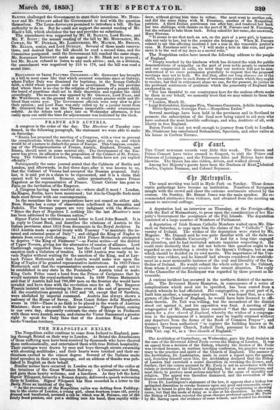FRANCE AND AUSTRIA.
A congress is the order of the day. The Moniteur of Tuesday con- firmed, in the following paragraph, the statement we were able to make on Saturday.
"Russia has proposed the meeting of a Congress, with a view to prevent the complications which the state of Italy might give rise to, and which would be of a nature to disturb the peace of Europe. This Congress, consist- ing of the Plenipotentiaries of France, Austria, England, Prussia, 'and Russia, should meet in some neutral city. The Government of the Em- peror has given its adhesion to the proposition of the Cabinet of St. Peters- burg. The Cabinets of London, Vienna, and Berlin have not yet replied officially."
Subsequently the same journal stated that the Cabinets of Berlin and London, and afterwards, in fact three days after it was known to us, that the Cabinet of Vienna had accepted the Russian proposal. Italy has, it is said put in a claim to be represented, and it is a claim that cannot well be resisted. Rumour, rather prematurely, names Prince Napoleon as the representative of France. Count Cavour has gone to Paris on the invitation of the Emperor. A Congress having been resolved on—where shall it meet ? London, the Hague, Berlin, have been mentioned ; but Aix-la-Chapelle finds most finds most favour with our contemporaries.
In the meantime the war preparations have not ceased on either side. Even Russia has a corps of observation echelloned in Bessarabia and Podolia. The German papers are very indignant with the Honiteur. 4' Since the days of Napoleon I. nothing like the last Moniteur's note lies been addressed to the German nation."
Signor Farini has written a second letter to Lord John Russell. It is in reply to Count Buol, and describes the relations of Austria to the Italian provinces since 1815 from documents in the Royal Archives. In 1815 Austria made a special treaty with Tuscany " to. maintain the in- ternal and external peace of Italy" ; and obliged the King of Naples to abstain from every civil change. In 1816 Prince Metterinch attempted to deprive " the King of Piedmont "—so Farini writes—of the district of Upper Novara, giving her the alternative of cession of alliance. Lord Castlereagh supported these views, but the Court of Russia refused to sanction such a violation of treaties. In 1820 Austria was ready to in- vade Naples without waiting for the sanction of the King, and at Lay- bach. Prince Metternich said that Austria would make war upon the King of Naples if he granted representative institutions. In 1822 Prince Metternich said that the representative system cannot and ought not to be established in any state in the Peninsula." Austria tried to make King Carlo Felice exact a bond from the Prince of Carignano that he would maintain the royal authority intact. In 1830 Prince Metternich said that if Austria had had 700,000 men on the frontier she would have invaded and have done with the revolution once for all. The Emperor Francis insisted on intervening in Rome even at the cost of general war. All the constitutions granted in 1847 and '48, except that of Sardinia, were abolished by imperial command. Austria has always shown a jealousy of the House of Savoy. Even Count Solaro della Marglierita wrote in 1835—There is no faith to be placed in the words of Austrian Ministers ; there is no credit in their promises." Signor Farb' ,i coming to our own day, eloquently contrasts the state of things in Piedmont with those were Austria sways, and claims for Victor Emmanuel a greater right to speak for Italy than that of the Austrian King of Lom- bardo-Venetian territory.


























 Previous page
Previous page